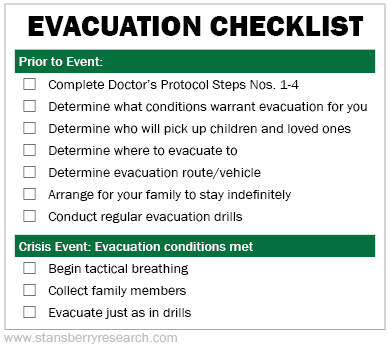We've written about some of the unexpected consequences of the COVID-19 pandemic already: eyestrain from prolonged screen time, increase in phone scams, the growing problems with opioid use, and more.
But there's another side effect we didn't plan on: A lack of natural disaster drills.
Several states that typically experience a high number of tornados in August actually cancelled their routine tornado drills. The reason? Concern over the unnecessary spread of coronavirus.
That's not good, especially given all the weather events we've already seen this month. In California, we had a new 200-acre brush fire near L.A. And at the time of this writing, here on the East Coast, we're still drying out from the first hurricane of the season. Isaias turned to a tropical storm after it made landfall, but it still brought flooding, high winds, and tornados. In Maryland, we saw several tornados and massive flooding.
Canceling tornado drills to prevent COVID-19 reflects the craziness of 2020. It's a chilling reminder that no one will take care of you.
No matter where you live or what disaster you may face, if disaster hits, you can't rely on anyone to come save you. Not your family, not your neighbors, not even FEMA.
We've seen how poorly the government has handled past crises, most notably Hurricane Katrina. But what you might not know is that we had plenty of warning for Katrina and the government failed to prepare for it.
In 2004, Category 5 Hurricane Ivan had all the signs of making a direct hit to New Orleans. Officials warned the city's levees wouldn't last. They also warned that using the Superdome football stadium as a shelter wouldn't work – that it wouldn't be enough room and may not withstand the storm.
At the last moment, Ivan veered away from the city. You'd think that the town's government used that as a lesson to prepare for the next storm. They didn't. Government officials didn't reinforce the levees, nor did they make better plans for shelters.
Just 11 months later, Katrina hit New Orleans directly. Sure enough, the levees broke and the city flooded, along with the Superdome. Millions needed to evacuate. Folks seeking refuge didn't have enough supplies. More than 1,800 people lost their lives.
That's why I always say do not wait for "official" orders or decrees. Follow your own disaster preparedness plan. Act according to your predesigned and practiced plan and it will save your life.
Book knowledge is useful... but you can never replace practical experience. You MUST practice your emergency plans on a regular basis. I prefer to keep mine current on at least a quarterly basis.
The good news is, this practice doesn't have to be time consuming. There is a great "cheat sheet" approach to emergency preparedness. And it involves using checklists.
For example, the military uses written standard operating procedures for every activity it conducts. Checklists are integral to ensuring success. They're an easy way to make sure personnel follow the correct procedures every time. Ask any pilot and he'll tell you... he won't even think about flying an airplane before completing his pre-flight checklist.
You can create checklists based on what I cover in my book, The Doctor's Protocol Field Manual. In it, I detail steps on how to handle various crises.
After reading my book, you can create checklists that codify your response plans. They should be right to the point. Cut out all extraneous data. You don't need explanations in checklists. You just need the appropriate steps to take, listed in the proper order.
Remember, checklists can be physical or mental. Set up physical checklists on paper for your most likely disaster situations. But also make a mental checklist every time you enter a new potential crisis environment.
For example, going to a movie theater and noting where the exits are located is part of forming a mental checklist. Ask yourself: If a disaster like a fire were to break out, what would I do? What would be my primary escape route? What would be my backup route? How would I shepherd my family away?
It's a simple mental exercise of no more than 30 seconds, and it can make all the difference in your survival. If a crisis happens, you will be confident and ready to act immediately... ready to carry out your mental checklist.
Here's a sample checklist for preparing for an evacuation.

Whether it's a hurricane, tornado, wildfire, or something man-made, the next disaster is coming soon. Now is the time to learn how to prepare.
I urge you to read The Doctor's Protocol. Current Retirement Millionaire subscribers can access it right here. If you don't have a subscription, click here to sign up today.
What We're Reading...
- Learn more about Hurricanes Ivan and Katrina in Tim Harford's podcast.
- Something different: Something else to cry about.
Here's to our health, wealth, and a great retirement,
Dr. David Eifrig and the Health & Wealth Bulletin Research Team
August 6, 2020
